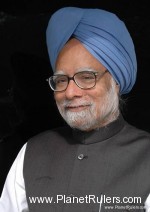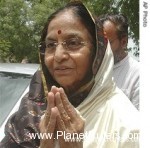Narendra Modi, Prime Minister of India (since May 26, 2014)

Born to a Gujarati family in Vadnagar, Modi helped his father sell tea as a child, and later ran his own stall. He was introduced to the RSS at the age of eight, beginning a long association with the organisation. He left home after graduating from school, partly because of an arranged marriage which he rejected. Modi travelled around India for two years, and visited a number of religious centres. He returned to Gujarat and moved to Ahmedabad in 1969 or 1970. In 1971 he became a full-time worker for the RSS. During the state of emergency imposed across the country in 1975, Modi was forced to go into hiding. The RSS assigned him to the BJP in 1985, and he held several positions within the party hierarchy until 2001, rising to the rank of general secretary.
Modi was appointed Chief Minister of Gujarat in 2001, due to Keshubhai Patel’s failing health and poor public image following the earthquake in Bhuj. Modi was elected to the legislative assembly soon after. His administration has been considered complicit in the 2002 Gujarat riots, or otherwise criticised for its handling of it, although a court found no evidence to prosecute Modi. His policies as chief minister, credited with encouraging economic growth, have received praise. His administration has been criticised for failing to significantly improve health, poverty, and education indices in the state.
Modi led the BJP in the 2014 general election, which gave the party a majority in the Lok Sabha, the first time a single party had achieved this since 1984. Modi himself was elected to parliament from Varanasi. Since taking office, Modi’s administration has tried to raise foreign direct investment in the Indian economy, increased spending on infrastructure, and reduced spending on healthcare and social welfare programmes. Modi has attempted to improve efficiency in the bureaucracy, and centralised power through the abolition of the planning commission. He has begun a high-profile sanitation campaign, and weakened or abolished environmental and labour laws. Credited with engineering a political realignment towards right-wing politics, Modi remains a figure of controversy domestically and internationally over his Hindu nationalist beliefs and his role during the 2002 Gujarat riots, cited as evidence of an exclusionary social agenda.
In accordance with Ghanchi tradition, Modi’s marriage was arranged by his parents when he was a child. He was engaged at age 13 to Jashodaben, marrying her when he was 18. They spent little time together and grew apart when Modi began two years of travel, including visits to Hindu ashrams. Reportedly, their marriage was never consummated, and he kept it a secret because otherwise he could not have become a ‘pracharak’ in the puritan Rashtriya Swayamsewak Sangh. Although Modi kept his marriage secret for most of his career, he acknowledged his wife when he filed his nomination for a parliamentary seat in the 2014 general elections. Modi maintains a close relationship with his mother, Hiraben and often visits her on his birthday to seek her blessings.
A vegetarian, Modi has a frugal lifestyle and is a workaholic and introvert. Adept at using social media, he has been since September 2014 the third-most-followed leader in the world (with over 34.6 million followers on Twitter as of September 2017), behind Barack Obama (95.6 million followers) and Donald Trump (38.8 million followers). Modi’s 31 August 2012 post on Google Hangouts made him the first Indian politician to interact with netizens on live chat. Modi has also been called a fashion-icon for his signature crisply ironed, half-sleeved kurta, as well as for a suit with his name embroidered repeatedly in the pinstripes that he wore during a state visit by US President Barack Obama, which drew public and media attention and criticism. Modi’s personality has been variously described by scholars and biographers as energetic, arrogant, and charismatic.
The nomination of Modi for the prime ministership drew attention to his reputation as “one of contemporary India’s most controversial and divisive politicians.” During the 2014 election campaign the BJP projected an image of Modi as a strong, masculine leader, who would be able to take difficult decisions. Campaigns in which he has participated have focused on Modi as an individual, in a manner unusual for the BJP and RSS. Modi has relied upon his reputation as a politician able to bring about economic growth and “development”. Nonetheless, his role in the 2002 Gujarat riots continues to attract criticism and controversy. Modi’s hardline Hindutva philosophy and the policies adopted by his government continue to draw criticism, and have been seen as evidence of a majoritarian and exclusionary social agenda.
Source: https://en.wikipedia.org/wiki/Narendra_Modi
Ram Nath Kovind (since Jul 25, 2017)

Before entering politics, he was a lawyer for 16 years and practiced in the Delhi High Court and the Supreme Court until 1993.
Kovind married Savita Kovind on 30 May 1974. They have a son, Prashant Kumar, and a daughter, Swati.
Source: https://en.wikipedia.org/wiki/Ram_Nath_Kovind
Manmohan Singh, Former Prime Minister of India
India’s fourteenth Prime Minister, Dr. Manmohan Singh is rightly acclaimed as a thinker and a scholar. He is well regarded for his diligence and his academic approach to work, as well as his accessibility and his unassuming demeanour.
Prime Minister Manmohan Singh was born on September 26, 1932, in a village in the Punjab province of undivided India. Dr. Singh completed his Matriculation examinations from the Panjab University in 1948. His academic career took him from Punjab to the University of Cambridge, UK, where he earned a First Class Honours degree in Economics in 1957. Dr. Singh followed this with a D.Phil in Economics from Nuffield College at Oxford University in 1962. His book, “India’s Export Trends and Prospects for Self-Sustained Growth” [Clarendon Press, Oxford, 1964] was an early critique of India’s inward-oriented trade policy.
Dr. Singh’s academic credentials were burnished by the years he spent on the faculty of Punjab University and the prestigious Delhi School of Economics. He had a brief stint at the UNCTAD Secretariat as well, during these years. This presaged a subsequent appointment as Secretary General of the South Commission in Geneva between 1987 and 1990.
In 1971, Dr. Singh joined the Government of India as Economic Advisor in the Commerce Ministry. This was soon followed by his appointment as Chief Economic Advisor in the Ministry of Finance in 1972. Among the many Governmental positions that Dr. Singh has occupied are Secretary in the Ministry of Finance; Deputy Chairman of the Planning Commission; Governor of the Reserve Bank of India; Advisor of the Prime Minister; and Chairman of the University Grants Commission.
In what was to become the turning point in the economic history of independent India, Dr. Singh spent five years between 1991 and 1996 as India’s Finance Minister. His role in ushering in a comprehensive policy of economic reforms is now recognized worldwide. In the popular view of those years in India, that period is inextricably associated with the persona of Dr. Singh.
Among the many awards and honours conferred upon Dr. Singh in his public career, the most prominent are India’s second highest civilian honour, the Padma Vibhushan (1987); the Jawaharlal Nehru Birth Centenary Award of the Indian Science Congress (1995); the Asia Money Award for Finance Minister of the Year (1993 and 1994); the Euro Money Award for Finance Minister of the Year (1993), the Adam Smith Prize of the University of Cambridge (1956); and the Wright’s Prize for Distinguished Performance at St. John’s College in Cambridge (1955). Dr. Singh has also been honoured by a number of other associations including by the Japanese Nihon Keizai Shimbun.
Dr. Singh has represented India at many international conferences and in several international organizations. He has led Indian Delegations to the Commonwealth Heads of Government Meeting in Cyprus (1993) and to the World Conference on Human Rights in Vienna in 1993.
In his political career, Dr. Singh has been a Member of India’s Upper House of Parliament (the Rajya Sabha) since 1991, where he was Leader of the Opposition between 1998 and 2004.
Dr. Singh and his wife Mrs. Gursharan Kaur have three daughters.
Pratibha Patil, Former President of India
Name : Smt. Pratibha Devisingh Patil
Father’s Name : Shri Narayan Rao
Date of Birth : 19th December, 1934
Place of Birth : Distt. Jalgaon (Maharashtra)
Marital Status : Married on 7th July, 1965
Spouse’s Name : Sh. Devisingh Ransingh Shekhawat
Children : One son & one daughter
Educational Qualifications : M.A., LL.B.Educated at M.J. College, Jalgaon (Maharashtra) & Govt. Law College, Bombay.
Profession : Social worker, practiced as Advocate at Jalgaon.
Permanent Address :
(a) 57, New Congress Nagar, Opp. Govt. Milk Scheme, Amravati (Maharashtra)
(b) 1701, Wainganga, Worli Sagar Cooperative Housing Society, Pochkhanwala Road, Worli, Bombay – 400 018.
Present Address :
Raj Bhawan, Civil Lines, Jaipur. Tel. (0141) 2228792 (Secretary), 2228716 (PBX) Fax (0141) 2228737 (ADC)
Political Career
*
Governor of Rajasthan: November 8, 2004 – present
*
Member of Parliament(Lok Sabha and Rajya Sabha): 1985 – 1996
Constituency: Amravati
*
Member of Maharashtra Legislative Assembly: 1962 – 1985
*
Deputy Minister, Public Health, Prohibition, Tourism, Housing and Parliamentary Affairs, Govt. of Maharasthra: 1967-72
*
Cabinet Minister, Social Welfare, Govt. of Maharashtra: 1972-74
*
Cabinet Minister, Public Health and Social Welfare, Maharasthra: 1974-75
*
Cabinet Minister, Prohibition, Rehabilitation and Cultural Affairs, Govt. of Maharashtra: 1975-76
*
Cabinet Minister, Education, Govt. of Maharashtra: 1977-78
*
Leader of Opposition, CLP(I), Govt. of Maharashtra: 1979-1980
*
Cabinet Minister, Urban Development and Housing,
Govt. of Maharashtra: 1982-85
*
Cabinet Minister, Civil Supplies and Social Welfare,
Govt. of Maharashtra : 1983-85
*
Elected to Rajya Sabha: June, 1985-90
*
Deputy Chairman, Rajya Sabha: 1986-1988
*
Chairman, Committee on Privileges, Rajya Sabha Member, Business Advisory Committee, Rajya Sabha: 1986-88
*
Elected to 10th Lok Sabha Chairperson, House Committee, Lok Sabha: 1991
*
Governor of Rajasthan: 8 November 2004
Pratibha patil’s Family Life
Born into the wealthy Jalgaon town of Maharashtra, Pratibha Patil was married to Devisingh Shekhawat of Amravati in Vidarbha 42 years ago. They have one sone and one daughter.
————————————————————————–
Prathibha Patil is a post-graduate in arts and law, having studied both in the small town and in Mumbai. She was first elected to the Maharashtra assembly in 1962. She remained a member of the house until 1988.
From 1967 to 1972, she was a deputy minister in the Maharashtra government, and then from 1972 to 1978 was a cabinet minister in the state holding several portfolios. She was the opposition leader in the Maharashtra assembly in 1979-80.
For two years from 1986, Pratibha Patil was deputy chairman of the Rajya Sabha. Widely travelled, she was last elected to the Lok Sabha in 1991, in the general election marred by the assassination of Rajiv Gandhi.
Besides having been president of the Maharashtra Congress chapter, she is credited with establishing hostels for “working women” in Mumbai and New Delhi, an engineering college at Jalgaon for rural youth, a women’s cooperative bank also at Jalgaon, and schools for poor children in Maharashtra.



